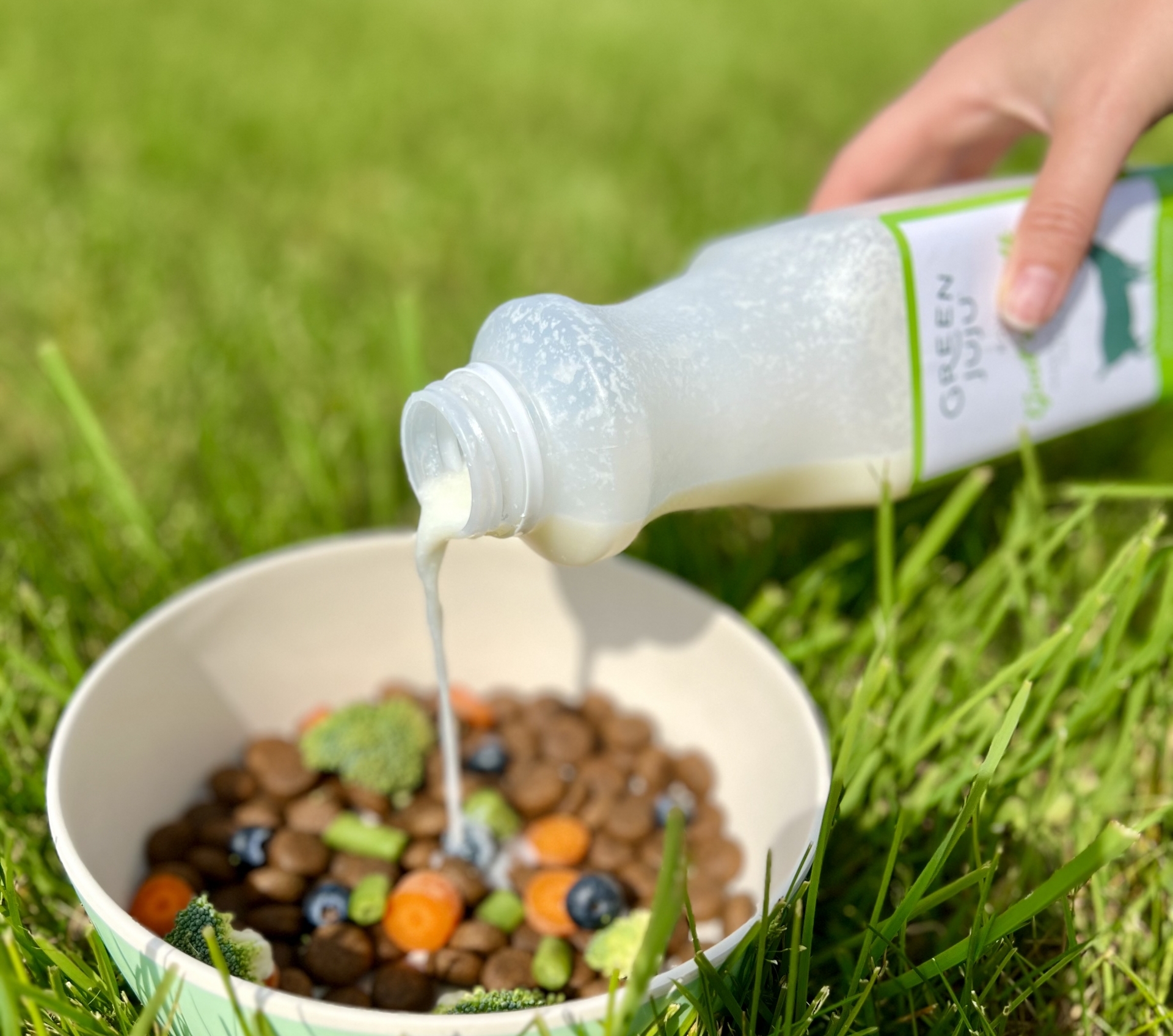How to Improve the Quality of Dry Food
We recommend a variety of supplements for varying reasons, however the most common reason is to improve upon a kibble. For example, we may add moisture to aid in digestion and to reduce inflammation. Or, we may add omega 3’s to improve skin and coat health. Here are some of our favorite tips for improving the health of your pet on dry food:
1. Add Water
Feeding kibble, no matter the brand or quality, can lead to subclinical dehydration in pets if given consistently. This can result in chronic inflammation, which may not be visible externally until the pet is older or ill. Over the past 25 years, there has been an increase in young pets with obesity, kidney disease, arthritis, diabetes, liver failure, skin disorders, inflammatory bowel disease, and cancer. Previously, it was uncommon to see such diseases in young pets, but now it is unfortunately commonplace. This can be attributed to factors like poor diet quality, environmental toxins, excessive vaccinations, and inadequate breeding practices. For this reason, we always suggest adding some form of hydration to your pet’s meal. Bone broth, goat milk, and water are all fantastic ways to add moisture.
2. Add Fresh Food
If you’re not comfortable giving your pet raw meat scraps, you can gently cook them without seasoning or oils before adding them to your pet’s bowl. You can also add vegetables and fruits like sweet potato (with skin), yellow and green squash, green beans, broccoli, grated carrots, blueberries, watermelon, and leafy greens. It’s best to gently steam and puree them, but it’s not necessary. You can make large batches ahead of time, mix them with some coconut oil, and freeze them into pre-portioned sizes using ice cube trays. This not only saves time but also reduces waste by using up produce that would otherwise go bad.
3. Add Quality Canned or Freeze-Dried Food
Consider adding high-quality canned food or freeze-dried options that are high in meat protein. Many pet food companies offer such products that can complement your pet’s kibble. While fresh foods are preferred, these options are a great way to reduce the carb percentage in your pet’s diet. Most kibbles are high in carbohydrates, with even the best ones containing 25% and the average kibble containing about 45% carbs.
4. Supplements
Supplements can play a crucial role in your pet’s health, and there are a variety of options to choose from. Fish oil, digestive enzymes, pre and probiotics, coconut oil, green lipped mussel, cranberry, CoQ10, and glucosamine with chondroitin are some of my favorites. While it may seem overwhelming to give your pets multiple supplements, it’s important to remember that not every supplement needs to be given at every meal or even every day. I rotate and provide a variety of supplements to my pets based on their individual needs.
- Marine Oils – Marine oils are a game-changer for pets’ health, but not all oils are created equal. To experience reduced inflammation, better digestion, healthier skin and coat, it’s important to have a proper balance of Omegas 3 and 6. Marine oils also have many cardiovascular benefits. However, many marine oils available today are already oxidized (rancid) before you even open the product, which can have a negative effect on you or your pet. A good rule of thumb is to avoid fish oil that smells fishy. Fortunately, Nordic Naturals offers a high-quality fish oil product that is not exposed to oxygen during the distillation process. It also comes in a light-block glass bottle for liquid oils and offers exceptional quality capsules. Adored Beast’s phytoplankton supplements are another sustainable and environmentally friendly option that provides EPA, DHA, vitamins, minerals, and antioxidants efficiently.
- Probiotics – Probiotics are good bacteria that support the body’s overall function. Prebiotics, on the other hand, provide food for probiotics and are essential to their function. The microbiome is made up of a healthy community of bacteria, viruses, and fungi that aid digestion and carry out important chemical processes. Recent research highlights the crucial role of a diverse and healthy microbiome in keeping our pets (and ourselves) functioning at their best. Pre and probiotics can often help with various issues like digestive problems, skin conditions, bad breath, anxiety, and even certain behavioral problems. Remember, the right balance of gut bacteria is crucial for the proper production of neurotransmitters, which act as chemical messengers.
- Digestive Enzymes – High quality digestive enzymes are essential for pets consuming commercial food. They aid in breaking down food better and promoting nutrient absorption. The extensive processing involved in transforming fresh food into kibble complicates the metabolization of food in the body, making digestive enzymes a crucial factor. In cases where a pet suffers from chronic diarrhea or vomiting, digestive enzymes may be the missing piece that leads to better health.
- CoQ10 – CoQ10 is primarily sourced by the body itself, and production decreases with age. Cells utilize CoQ10 to generate energy. Additionally, CoQ10 helps to prevent damage to cells and DNA. CoQ10 can also help to slow normal aging as well as promote a healthy immune system.
While supplements can be beneficial, they should never replace a pet’s proper nutrition or the advice of a veterinarian. It’s essential to understand that every pet is unique, and what works for one may not work for another. If you need more information or personalized recommendations, our knowledgeable team is always ready to assist you.






